We, too, made the long and arduous pilgrimage the three or so kilometres from our house. I trust Our Lady of Csiksomlyo appreciated it. We flowed along, with a river of people, through the village of Somlyo, along the main street with its embankments of stalls selling wooden handicrafts from Transylvania and plastic handicrafts from China. We stopped occasionally to greet people we knew and eventually, it being a hot sunny spring day (finally), we sat down to have a well deserved beer. Or at least I did, my female companions were all after turd-like barbecued things and soft drinks. But this was where I had my first shock. No beer. Now, let’s recap: This is a warm (by English terms, positively hot) day. It’s about 2pm, and there are huge crowds of people, all of whom are out in the same warm weather. A nice refreshing glass of Csiki Sör is quite obviously the order of the day. But no. This apparently is a dry (in the alcohol-free sense) festival. This is not, as you may now be suspecting, the Hajj. It is not a pilgrimage by some other well known teetotal religion, the 7th Day Adventists, or the Southern Baptists or someone (are the Southern Baptists teetotal? And where do they pilgrim to? The White House?). This is a Catholic pilgrimage. Y’know, the Roman Catholics. The religion that is so sozzled in booze that they even incorporate wine in their holiest ritual. Not this lot. We’d obviously happened upon the Islamic wing of the Catholic Church. I was shocked (and not a little parched). I bet others had come prepared. Nuns with bottles concealed under their capacious habits, monks with tequila in their cassocks, and all those large crucifixes have room, hollowed out, for a few decilitres of palinka I’ll bet. There must have been ways around it.
So, we went without. After the turds had been consumed, we carried on our way, and realised now that we were swimming against the current. Somehow during our stop the river had changed direction. It seemed that the mass, which was the high point of the day, was over, and now, heading up the hill towards the open air valley in which the religious part of the day took place, was the wrong way to be going. But struggle on we did, and fortunately (I was later to realise) we did so against the earlier leavers. The people who leave five minutes before the final whistle/hymn so as to avoid the traffic. They didn’t avoid it, because they were among 50,000 or so who had had the same thought, but they tried.
It was when we got half way or so up the hill that I started to appreciate this event. I mean the place was packed (have I mentioned how many people there were at this thing?). The mass had taken place on a saddle (I think that’s the word, kind of a valleyette between two hills), and as we got half way up the smaller of the two hills, the sheer scale of the event became apparent. There were bloody millions of them. Well, now, perhaps, I’m exaggerating, but y’know, lots. Many of the people were in traditional costume (in Romania it seems to me that many people wear their traditional costume to church on Sundays rather than merely for tourist videos). Groups of them were carrying large banners and flags. As we stopped at a conveniently shady vantage point on the walk down the hill to take photos, we got to see many of them as they walked past. They did so for the most part in village groups, each village carrying a banner announcing their origin. Most were in costume, and many were singing. Not for the first time I got it. What it is that people get out of religion. It’s this sense of community, this sense of togetherness. Now, frankly I have no wish to be part of a community whose leaders are a bunch of misanthropic homophobes who think it’s better that people die of AIDS than use condoms, but I do get why people want and need to be a part of something. And I was moved by it all. Yes, even cynical old me. A little while later as we slowly walked across the hilltop on a different route home we saw in the far distance one of these village groups walking still in formation along a road back home. It was difficult not to get a shiver of humanity from it all.
While we sat and watched the crowds descend from their annual mind-melding with the Madonna (or whatever it is that the true believer gets from the whole shebang aside from the togetherness bit), an older man next to me asked me in English where I was from. As we talked I found out that he was a Hungarian from Budapest who had fled the Soviet tanks in 1956 and spent 48 years living in Los Angeles. He had returned to Budapest last year, and when I asked him about how that was he looked a little pained and eventually said “mixed feelings”. He went on to say how he felt people (in Budapest) were too aggressive and impolite and insincere and unfriendly. It occurred to me as it had never occurred to me before how difficult and painful this transition must be. To flee your home as a refugee as a young person and spend so long away, dreaming of when your people will be free, when your homeland will be open, when you will be able to return to your old haunts and the place you remember so vividly. To spend years reminiscing of your home, slowly but surely building it into an impossible utopia is one thing. But then to go back, late in life to rediscover that dream, and find that it doesn’t (indeed can’t) live up to that fantasy. It must be crushing. I really didn’t know what to say to him, and could only be glad that he was clearly enjoying this day and this feeling of community he was getting on this hillside.
So, all in all, a good experience. It had an unfortunate whiff of nationalism about it – I’ve never seen that many Hungarian flags, and they were doing a roaring trade selling t-shirts with the word IGEN (yes) written in huge letters, a reference to the failed referendum in Hungary last December (see here). which smacked not so much of closing the stable door after the horse has bolted but in doing so after it was made into glue months previously – but I guess that’s understandable, since it must be the biggest annual gathering of Transylvanian Hungarians. (Although I have to say that the linking of religion and nationalism is one of those things that most bother me about most religions and their hierarchy.) And the nationalism of the minority is a nationalism that I can to some degree understand, at least, if not condone. But aside from that and the plastic tat and yu-gi-oh cards on sale in the main street leading up to it, I thought the whole thing was great. And of course, as I was aware all day long, I had beer in the fridge for when I got home
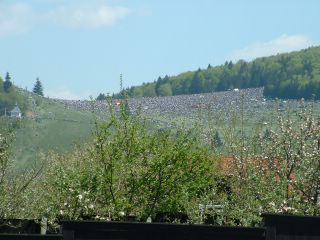
The mass from a distance
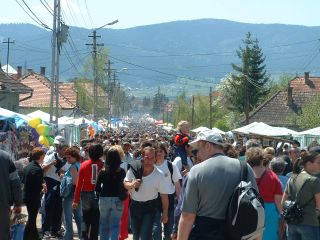
These are the people who aren't even at the mass
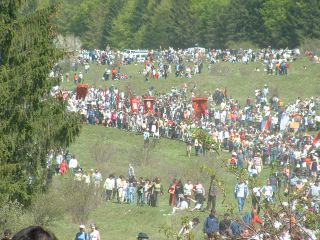
Some of the massers coming down
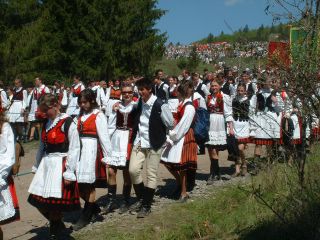
More post-massing
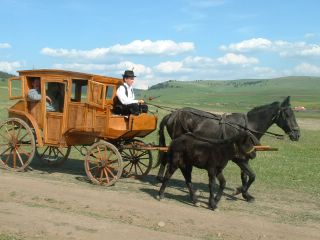
someone leaving in style




6 comments:
Andy,
Why is 'nationalism' is a bad word?
Why do you equate nationalism with patriotism?
These people ARE Hungarians. Why shouldn't they love, and moreover, demonstrate their love for their country --- not Romania, but rather Hungary.
Hmm that's three questions. I'll answer them in order.
Q. 1: "Nationalism" to me means "the doctrine that your national culture and interests are superior to any other" (this came from the dictionary definition at WordNet quoted at dictionary.com). That site also gives a number of other definitions which are less bad. I think that at least under that definition (the one I quote) it is a bad word. Wouldn't you agree?
Question 2: Well, I don't equate it with patriotism. Patriotism is much more accpetable to me (from the same site: "n : love of country and willingness to sacrifice for it") I don't object to people loving their country, merely when they start thinking their country is inherently better than any other.
Third question is trickier. There's no reason why people shouldn't demonstrate their love for their country, and I don't object to it. My problem is with nationalism, not patriotism as I've said. And in the text I said that their was a "whiff" of nationalism. Not that it was a nationalistic event, merely that there was a hint of nationalism (Dictionary.com again "Whiff: A minute trace")
I have a feeling I haven't fully answered your last question, do you want to rephrase it so I can better answer it?
Thanks
andy
Very interesting piece Andy.
Coming from N.Ireland originally, the mixture of religion and nationalism/patriotism also makes me uneasy.
I don't know if you seen in Budapest on Felvonulasi Ter, the monument to the church that Rakosi pulled down in the 1950s. A wooden cross has been placed on the site and has been draped in the Hungarian flag. That to me is a sacrilegious act and one that is not in line with Jesus' teachings in the New Testament.
The affirmation of your national identity be it Irish, British, Hungarian or Romanian should not be mixed with your religious beliefs.
" "Nationalism" to me means "the doctrine that your national culture and interests are superior to any other" (this came from the dictionary definition at WordNet quoted at dictionary.com). That site also gives a number of other definitions which are less bad. I think that at least under that definition (the one I quote) it is a bad word. Wouldn't you agree?"
A rather stupid definition, and clearly one you chose to cherry pick ( typing define:nationalism into google gets the more normative description).
Nationalism is merely the belief that national, or ethnic groups exist, and have a right to self determination. The palestinians are nationalists, as are the people of the Native American reservations, and most anti-imperialistic struggles were nationalist. The imperialists, however, were anti-nationalistic and internationalist : that includes German fascism which was an open borders movement for Germans , the British and other European empires, and the "internationalism" of the Sovietization of Eastern Europe, which was in reality a Russification. The nationalists around world defended themselves against such depredations.
All you saw here was people celebrating their culture, and accused them of claiming that their culture was superior to the world, which is not their claim at all, merely that it is different. It is, however, your claim.
The spurious "internationalism" of the Anglo-sphere is no more neutral than the Soviet version. A person, or people. who dont see themselves as nationalistic are part and parcel of the hegemonic culture ( in your case the Anglo-Sphere). This culture is in no way neutral, nor anti-nationalist: indeed, quite the reverse. One can imagine a different world where the Americans spoke Hungarian and English minorities, ( or American English speakers) march to preserve their culture: earning the guffaws of the Hungarian "international" elite. There is no such thing as no culture, no such thing as no laws, and no such thing as no nationalism.
The next time you hear the turgid lyrics of Imagine, ask yourself: if there is to be no country what country would it be? what laws would it hold? and what culture would it express? The answer is int he question: the laws, culture, and nationalism of the writer and singer. Only the most powerful cultural forces see themselves as neutral.
" "Nationalism" to me means "the doctrine that your national culture and interests are superior to any other" (this came from the dictionary definition at WordNet quoted at dictionary.com). That site also gives a number of other definitions which are less bad. I think that at least under that definition (the one I quote) it is a bad word. Wouldn't you agree?"
A rather stupid definition, and clearly one you chose to cherry pick ( typing define:nationalism into google gets the more normative description).
Nationalism is merely the belief that national, or ethnic groups exist, and have a right to self determination. The palestinians are nationalists, as are the people of the Native American reservations, and most anti-imperialistic struggles were nationalist. The imperialists, however, were anti-nationalistic and internationalist : that includes German fascism which was an open borders movement for Germans , the British and other European empires, and the "internationalism" of the Sovietization of Eastern Europe, which was in reality a Russification. The nationalists around world defended themselves against such depredations.
All you saw here was people celebrating their culture, and accused them of claiming that their culture was superior to the world, which is not their claim at all, merely that it is different. It is, however, your claim.
The spurious "internationalism" of the Anglo-sphere is no more neutral than the Soviet version. A person, or people. who dont see themselves as nationalistic are part and parcel of the hegemonic culture ( in your case the Anglo-Sphere). This culture is in no way neutral, nor anti-nationalist: indeed, quite the reverse. One can imagine a different world where the Americans spoke Hungarian and English minorities, ( or American English speakers) march to preserve their culture: earning the guffaws of the Hungarian "international" elite. There is no such thing as no culture, no such thing as no laws, and no such thing as no nationalism.
The next time you hear the turgid lyrics of Imagine, ask yourself: if there is to be no country what country would it be? what laws would it hold? what culture would it express? The answer is in he question: the laws, culture, and nationalism of the writer and singer. Only the most powerful cultural forces see themselves as neutral.
A rather stupid definition, and clearly one you chose to cherry pick
Well, I did say that i chose it out of a number of others to reflect my understanding of what natioanlism is and coinsequently the way I used it (and what I meant by it in the original article).
Now, to you it may be a "stupid definition" but it's the one I';ve grwon up understainding nationalism to mean. Frankly I was surprised how many other definitions of nationalism there were out there when I looked it up for this comment. So, anyway, to get back to my point - there was a slight unpleasant whiff of this "bad nationalism" at the pilgrimage. By which I mean on toip of the people celebrating and expressing their culture there was a hint (in the background) of anti-Romanian feeling.
I don't think anything I have written can be misinterpreted to mean anything else.
The rest of your comment contains so many straw men that I suspect it constitutes a fire risk.
Post a Comment